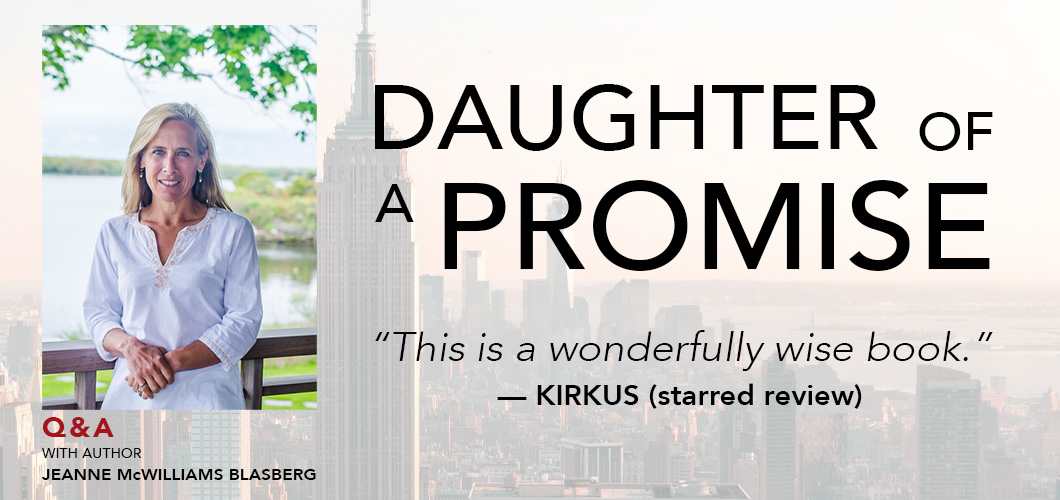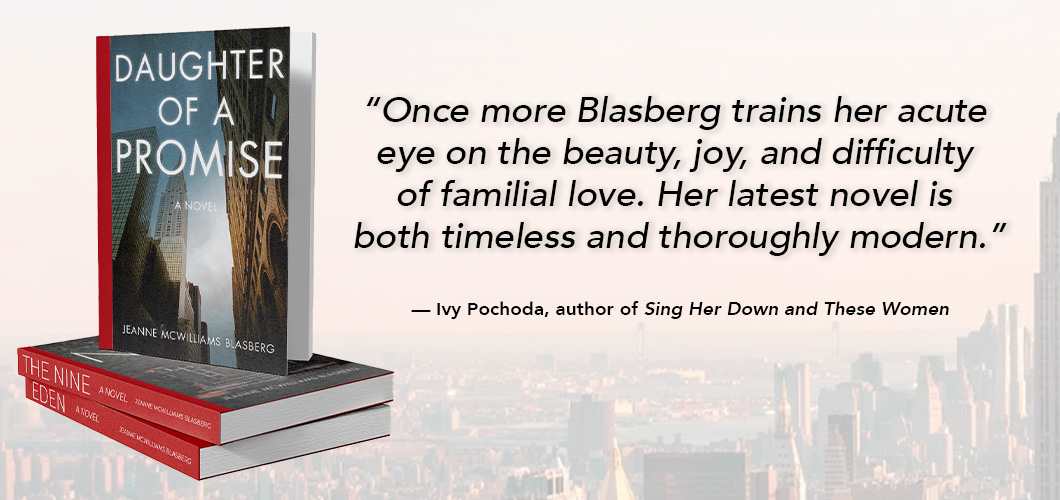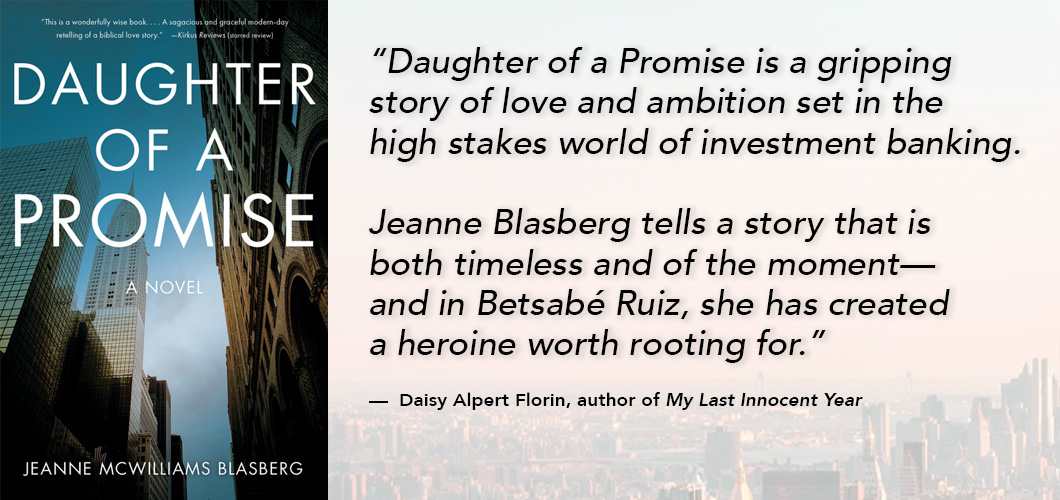Mining for Timeless Themes
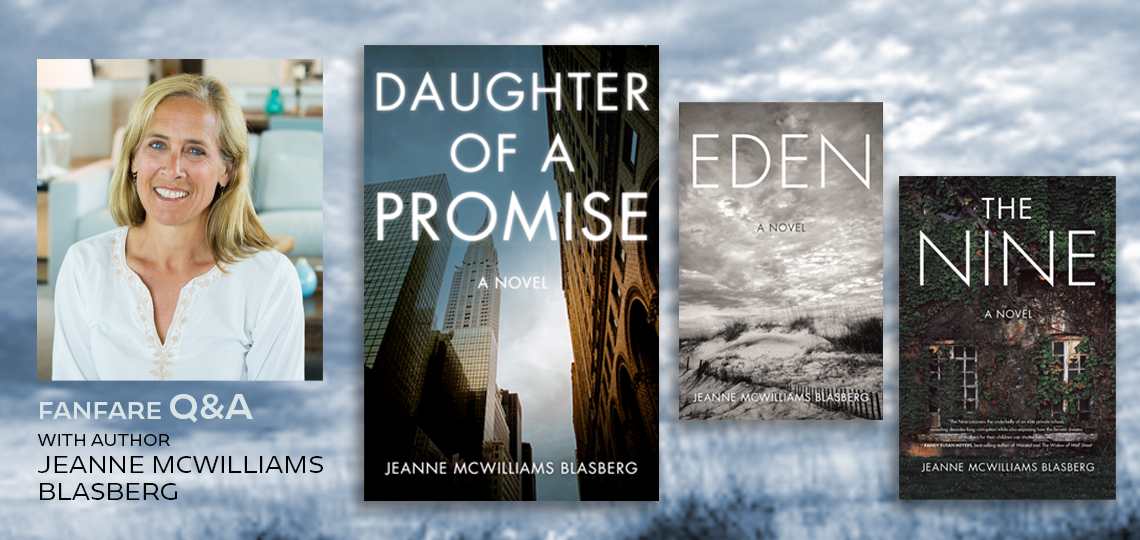
Executive Editor Matt Sutherland Interviews Jeanne McWilliams Blasberg, Author of Eden, The Nine, and Daughter of a Promise
With the writing chops of a pro, today’s guest Jeanne Blasberg has pulled from the rich pickings of her dynamic life to pen a trio of connected novels that explore mother-daughter relationships, privilege, domestic drama, and the ties that hold families together. She’s especially drawn to “outsider” female characters who challenge tradition, and also the timeless appeal of biblical stories updated for a contemporary audience. In the main, human nature is what interests her, especially when misunderstandings, buried wounds and denial are passed from one generation to the next.
Seeking to learn more about her books and enthusiasms, we asked Executive Editor Matt Sutherland to track down Jeanne for a thoughtful conversation.
Family dynamics, in the full gamut of configurations, is the driving force in all three of your novels. From Eden’s exploration of the difficulties in managing the inheritance of a seaside compound in Rhode Island among three generations of offspring, to a mother and son’s evolving relationship as he navigates a New England boarding school in The Nine, to your most recent release, Daughter of a Promise, in which a talented young woman of Cuban heritage graduates from college and lands in an unexpectedly frenetic career all while seeking to retain the strength and spiritual gifts she inherited from her mother and grandmother, your books don’t shy away from the joy, pain, confusion, and boundless love that is unique to blood relationships. Can you talk about why these topics are of such interest to you?
You are spot on with my obsession being domestic drama and family bonds, specifically behaviors that are passed down through generations and often exacerbated due to misunderstanding and secret-keeping. As an only child, I was always very observant and sensitive. As a daughter, mother, and a woman who had a very close relationship with her grandmother, I’ve thought a lot about emotional inheritance. I find parent-child relationships extremely fascinating as they are the genesis of both our deepest wounds as well as our greatest strengths. It’s a dynamic that I never get tired of reading about either.
Eden focused on four generations of matriarchy and the dynamics between mothers and daughters. The Nine provided the opportunity to explore how a mother feels when a child leaves home, especially at a young age, and the gradual recognition that their relationship has abruptly changed. In Daughter of a Promise, although Betsabé clings to the wisdom passed down from the women in her family, I was trying to explore the vulnerabilities a young adult might have when they feel they have missed out on a relationship with a parent, in this case with her father.
In Eden, you place Becca in the middle of a maelstrom of greed, resentment, and heartbreaking loss. As the matriarch and spouse to the man who frittered away the means to keeping the seaside home in the family, she tries and fails to keep the peace. What is it about old family money and property being lost by unscrupulous newer generations that makes for such rich material?
One reason fritting away a fortune is such rich material is because it happens a lot while being surprising and sort of tragic. Eden dwells on many cyclical patterns in nature, in human life, as well as in families, so why not include this one as described by Marilynn Robinson in the opening of Gilead: “The first generation learns it; the second generation earns it, the third generation spends it blindly, imagining itself beyond the reach of time.”
After the money is gone, some in the family feel compelled to “keep up appearances” which is also a form of secret-keeping and denial. These phenomena combine to whittle away at the fabric of a family.
Dunning Academy, posh New England boarding school that it is, has a secret society problem named The Nine. Surprised by the invitation to join his more pedigreed classmates, Sam joins the group but soon realizes these guys don’t just tell dirty jokes and snap towels at each other in the shower after lacrosse practice—and their malevolent mischief might just derail Sam’s Ivy League aspirations. The Nine really required you to understand the goings-on in an all-boy’s academy. What drew you to tell this story? How was it to get inside the heads of teen-aged boys coming of age in a privileged, albeit, sheltered environment?
I wrote The Nine at a time when the Spotlight team at the Boston Globe was uncovering so much heart-breaking scandal at New England’s top private schools, much in the same way it had broken the stories around sexual abuse in the Catholic church. I also wrote the book as the mother of two teenage boys who were attending boarding school, so the first draft came quickly in a fury of righteous indignation!
I went to a large public high school in Southern California, however, between my husband and three children I was regaled with stories of four different New England boarding schools. With the circumspection and wonder of an outsider, I just couldn’t resist. I also love campus novels because a campus is a self-governing microcosm of the world and provides a rich setting for scandal, cover-up, and heart-break.
Your latest novel, Daughter of a Promise—also the translation of the name of your protagonist, Betsabé—is written in the form of a letter to her unborn son about the breathless twelve-month period of her life right out of college when she lands a job at one of the country’s top investment banks. As an attractive young, female, second-generation Cuban in the whitest of business worlds, she stands out, to say the least. As happens, she finds herself in a passionate relationship with her boss and things get complicated. So, we have an imposter-syndrome issue in play with Betsabé, alongside her outsider status in the world of high finance, and then a love affair with a man of a very different level of power—that’s a steep set of obstacles to navigate. What should readers know about her skill set and ability to meet the challenges head-on? What should they know about you as a person and a writer to help them understand why you were the right person to write this novel?
Bets, as she’s known to her friends, is a very smart and capable young woman. She writes to her unborn son, Sol, about the year she was twenty-three, which for most of us is still a very formative time. I think it’s safe to say Bets makes some bad choices, but not any worse than many people make as young adults. She does not navigate her situation perfectly which I wrote very intentionally. I think it would be unrealistic to write about a young person in a new environment who doesn’t need some time to figure it out. At the beginning of that year, she completely discounts her family’s ability to relate to her life and offer guidance. However, once Bets taps into the values with which she was raised, she discovers her power and moral compass.
As a writer, I could relate to Bets because I graduated from college with degrees in American studies and Art History (Bets was a Psych and Theatre double major) but ended up in a similar investment banking training program. Every day I was there I felt in way over my head and I was constantly seeking mentorship. I have experienced a portion of the foreignness Bets would have felt, and although I could have chosen to write the story from the perspective of Rae, her best friend and roommate who would have been a culturally closer fit, I felt it important to learn as much as I could about Bets in order to tell this tale from her point of view.
Biblical imagery and stories have found a way into all three of your novels. Is faith and tradition something that has always been part of your fiction? Why is this important to you?
I am inspired to retell biblical tales in a modern context not necessarily due to my personal spirituality or faith, but in order to express the timelessness of the human experience. I find many of the personal relationships depicted in the Old Testament extraordinarily modern, reminding me that our species has been at this imperfect business of loving for thousands of years.
Daughter of a Promise is a retelling of the story of David and Bathsheba. This legend has been long debated with regard to whether there was sexual consent, and studying it during the #metoo era was part of the inspiration to write the novel. The Nine is inspired by the story of Hannah and Samuel where Hannah was infertile and prayed to GOD that she might bear a son. She even made a bargain while praying that she would turn a future son over to the Temple once he was weaned. The idea of handing over one’s child to a supposedly trust-worthy institution ignited my imagination, in part because I was experiencing similar trepidation as a mother. Eden, as you might guess from the title, explores the concept of paradise through a century of a family’s existence where a fortune is made and lost and reproductive freedoms establish the way its members understand one another.
What types of characters most interest you as a writer? Have parts and pieces of that character type appeared in all your novels? Which one character was the most fun for you amongst the three novels?
All three of my novels are set in rather privileged settings. I love to introduce outsiders into those settings because their points of view allow me to critique established traditions and societal systems. In Daughter of a Promise, Betsabé is the ultimate outsider. In The Nine, Sam, Hannah, and the third point of view character, teacher Shawn Willis, are all outsiders, and with regard to the Meister family in Eden, Lilly the housekeeper is the primary outsider and I loved writing from her point of view as she certainly had strong opinions!
Are there other ways your three novels are connected?
I began creating my imaginary world with Eden, specifically the summer community of Long Harbor, RI. In The Nine, Sam spends a summer with a friend from boarding school in that same town where he meets Rae Stern at a party. Rae was the baby born in the last scene of Eden. Rae is the best friend and roommate of Betsabé, the protagonist of Daughter of a Promise. This third novel revisits the women of Eden twenty years later in addition to an action-packed long weekend in which Rae has invited her best friend to visit the ancestral home. Ethan Pierce, who is Sam’s roommate at Dunning Academy, is Betsabé’s colleague in the investment banking training program. Each book can be enjoyed individually, but I had fun connecting them in order to further expand on themes such as privilege as well as ways in which women are defined by their fertility.
What novelists do you admire and look to for inspiration? What books are currently on your nightstand?
I am a fan of novelists who’ve mastered domestic drama. Works such as We Were the Mulvaney’s by Joyce Carol Oates was a favorite. I am also a huge fan of Barbara Kingsolver, Elizabeth Strout, and Ann Patchett. I enjoy reading memoirs and am inspired by the courage and self-reflection required to write them. I am currently reading Solito by Javier Zamora as well as re-reading Middlemarch by George Eliot.
Is there a different genre, style of writing, or change of pace for you that you’re interested in trying as a writer?
Yes! While I am continuing to draft fiction pieces, I am writing non-fiction pieces inspired by work on our farm and our nation’s broken food system.
THE NINE
She Writes Press (Aug 20, 2019)
Clarion Rating: 4 out of 5
School scandals and the fragile bond between a boy and his mother give The Nine wide-ranging appeal beyond its ivy-clad setting.
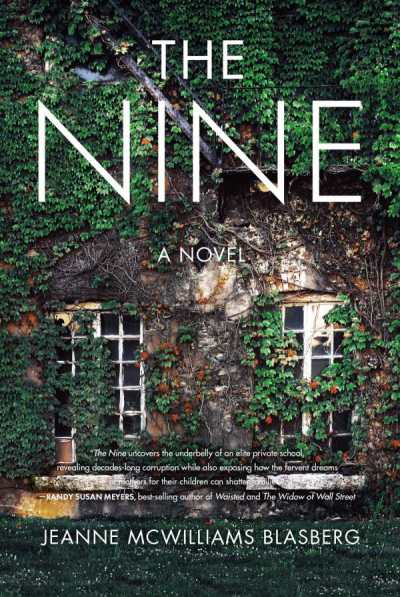
Jeanne McWilliams Blasberg’s unique coming-of-age novel The Nine is set at an exclusive New England boarding school where the ivy-covered walls conceal decades of dark secrets and subterfuge.
At Dunning Academy, legacy students know the shortcuts, while students like Sam Webber are left to navigate new territory without the help of alumni uncles and fathers. Sam finds his inroad by way of Justin Crandall, a legacy student who invites him into the school’s secret society, The Nine. Sam soon discovers that The Nine’s activities extend far beyond precocious pranks.
Meanwhile, Sam’s mother, Hannah, finds herself at loose ends now that her only son is no longer around to give her marriage and life direction. Hannah is drawn to the campus at every opportunity, making the trek from her suburban Boston home for swim meets, parents’ weekends, and even to watch Sam on a couple of occasions.
The school setting is one of the novel’s strongest attractions. Dunning Academy puts pupils through a rigorous course of study and an even more grueling gauntlet of social and emotional pressures on their path toward Ivy League universities and politically connected careers. Given the headlines coming from real-world campuses in recent years, the school’s hidden history and current crimes are all the more believable.
The often painful relationship between mother and son that serves as the novel’s secondary story is rendered through Sam’s more and more stilted responses to Hannah as the pressures and distance of Dunning drive the two apart. Hannah’s desperate conversations convey how her life is beginning to fall apart without Sam as its foundation.
Talk between teens on campus sounds truthful, with exchanges between boys avoiding sentimental subjects. Because of it, Sam’s classmates are developed characters who are seen to grow up physically and emotionally. Their individualized faces and feelings raise the stakes, especially when it comes to the malevolent mystery that Sam starts to uncover as he becomes involved with The Nine.
By comparison, Hannah doesn’t experience any deep insights about how her own Ivy League ambitions for Sam put him in harms’ way, even as Dunning threatens to derail his future. Still, Hannah, who tells part of the story, is easy to identify with, even while being hard to empathize with, because of her unflagging motherly ambition.
School scandals and the fragile bond between a boy and his mother give The Nine a wide-ranging appeal that extends beyond its ivy-clad setting.
Reviewed by Charlene Oldham August 20, 2019
EDEN
A NOVEL
She Writes Press (May 2, 2017)
Clarion Rating: 4 out of 5
Eden is an atmosphere-rich, thoroughly satisfying story of family connections.
Jeanne McWilliams Blasberg’s Eden is an inviting and cozy family saga, the perfect book to settle in to.
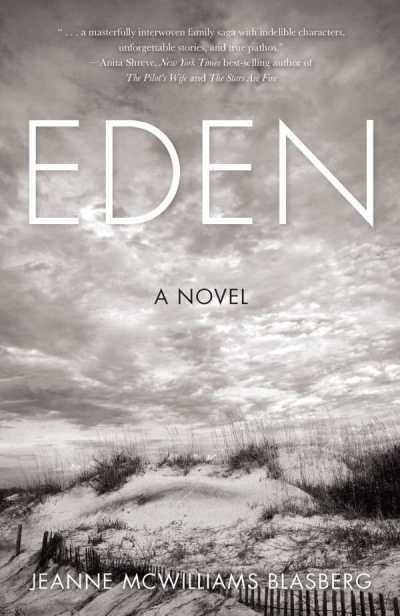
Being a widow is tough enough, but even tougher when generations of accumulated wealth have been frittered away by the dearly departed husband. The cherry on top is that as a result, Eden, the family’s to-die-for seaside compound in Rhode Island, must be sold to cover expenses.
Becca, the soon-to-be-homeless widow, summons everyone to a final Fourth of July holiday at the beloved cottage. She will break the news to the family while harboring hopes that her two brothers, who share a stake in Eden, will ride to its financial rescue.
Things get even stickier with the arrival of the first guest. Sarah, Becca’s favorite granddaughter, is pregnant, unmarried, and without a plan. Other members of this large family have their own issues, including greed, envy, and some very long-standing resentments. It isn’t long before these conflicts result in a fight for possession of Eden. Plots arise, alliances form, and secrets circle in the air like gulls. The profusion of family members can be a bit hard to keep straight at first, but a family tree at the front of the book is a handy reference.
The present-tense narration covers the weeks shortly before and after the holiday gathering. While this could make for a slow pace, it doesn’t. The story moves smoothly back and forth to explore other pivotal times in the family’s history, embracing a time frame that runs from 1915 to 2000. This keeps the pace—and the sense of discovery—moving.
While Becca is always the strong, uniting focal point, other chapters bring different family members to the fore, illuminating critical junctures of their lives. One of the pleasures of the book is that only the reader knows everything, while family members often keep things from each other.
With few exceptions, characters are well developed and believable, and their relationships shift and grow as the narrative unfolds. Becca initially despairs over her granddaughter Sarah’s blithe approach to single motherhood, but ends up finding strength in her. And just as each member of the clan has a unique relationship with other members, so does each character have a distinct relationship—and a wealth of memories—with the property that’s at stake.
The book makes great use of its coastal setting. It’s easy to picture Eden, the kind of sprawling, shabby-chic mansion that’s pinned to a million wish lists. The town that it borders is equally vivid, with elegantly restored buildings and the whiff of old money scenting its gardens and golf courses. The story deftly mines the town to show just how much money can be squandered in the race to keep up appearances.
At times, the text works too hard to establish its patrician feel. Becca’s father, the founding patriarch, was nicknamed Bunny; other characters have names like Camilla and Alistair, and gardening is a favored pastime, lending an air that’s more Balmoral than Newport. An engrossing story line and realistic central characters keep the book from sailing over the edge.
Eden is an atmosphere-rich, thoroughly satisfying story of family connections.
Reviewed by Susan Waggoner November 18, 2017
Matt Sutherland

